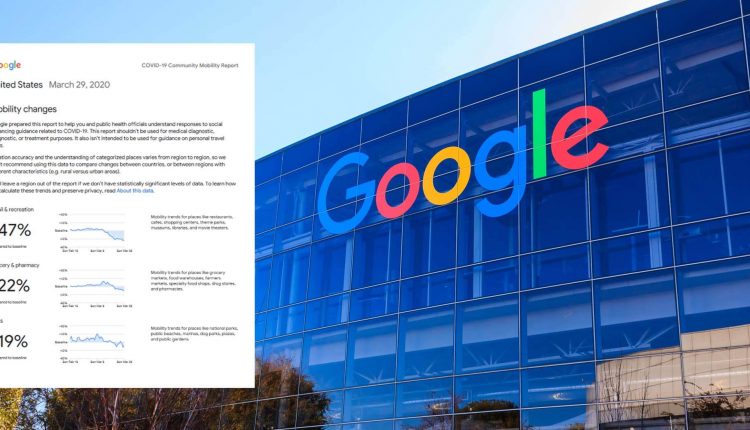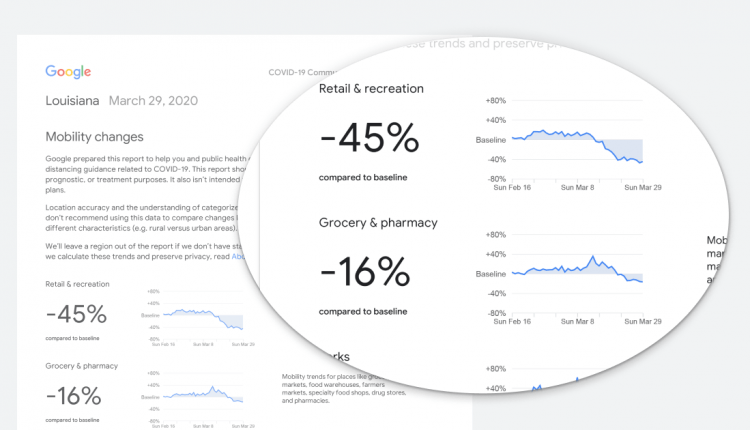Earlier in March, as numbers of COVID-19 transmissions rose across the globe, governments, under the World Health Organization (WHO) guidelines, had to take up drastic measures to prevent the situation from exacerbating. As of early April, with more than 1.2 million confirmed infections and a death toll of 70,356, the world is in panic.
In mid-March, a number of Arab nations had issued some sort of curfew to limit the movement of people in an effort to #FlattenTheCurve. So far, the region has been less-impacted compared to the rest of the world with leaders vowing to keep the status quo until the infection is contained.

Over the weekend, fine tech giant Google released the ‘COVID-19 Community Mobility Reports’, which show how communities around the world responded to the WHO guidelines of social distancing using data from its Google Maps App.
“These Community Mobility Reports aim to provide insights into what has changed in response to policies aimed at combating COVID-19. The reports chart movement trends over time by geography, across different categories of places such as retail and recreation, groceries and pharmacies, parks, transit stations, workplaces, and residential.” their website read.

Each report measures six metrics compared to a baseline, an average that was calculated prior to the COVID-19 crisis, and these metrics are:
- Retail and recreation: measures mobility trends for places like restaurants, cafes, shopping centers, theme parks, museums, libraries, and movie theaters.
- Grocery and pharmacy: measures mobility trends for places like grocery markets, food warehouses, farmers’ markets, specialty food shops, drug stores, and pharmacies.
- Parks: measures mobility trends for places like national parks, public beaches, marinas, dog parks, plazas, and public gardens.
- Transit stations: measures mobility trends for places like public transport hubs such as subway, bus, and train stations
- Workplaces: measures mobility trends for places of work.
- Residential: measures mobility trends for places of residence.
Google maintains that in the making of this report, the privacy of its users was not breached and that at no point in the future will the company release the locations of its users.

So here is how countries throughout the Middle East did over the past couple of days in terms of social distancing.
Saudi Arabia
- Retail and recreation: -54% compared to baseline.
- Grocery and pharmacy: -24% compared to baseline.
- Parks: -49% compared to baseline
- Transit stations: -75% compared to baseline.
- Workplace: -45% compared to baseline.
- Residential: +23% compared to baseline.
United Arab Emirates
- Retail and recreation: -55% compared to baseline.
- Grocery and pharmacy: -26% compared to baseline.
- Parks: -53% compared to baseline.
- Transit stations: -69% compared to baseline.
- Workplace: -45% compared to baseline.
- Residential: +26% compared to baseline.
Kuwait
- Retail and recreation: -56% compared to baseline.
- Grocery and pharmacy: -30% compared to baseline.
- Parks: -48% compared to baseline.
- Transit stations: -49% compared to baseline.
- Workplace: -42% compared to baseline.
- Residential: +23% compared to baseline.
Bahrain
- Retail and recreation: -45% compared to baseline.
- Grocery and pharmacy: -22% compared to baseline.
- Parks: -40% compared to baseline.
- Transit stations: -38% compared to baseline.
- Workplace: -25% compared to baseline.
- Residential: +16% compared to baseline.
Oman
- Retail and recreation: -52% compared to baseline.
- Grocery and pharmacy: -35% compared to baseline.
- Parks: -41% compared to baseline.
- Transit stations: -64% compared to baseline.
- Workplace: -34% compared to baseline.
- Residential: +17% compared to baseline.
Qatar
- Retail and recreation: -51% compared to baseline.
- Grocery and pharmacy: -25% compared to baseline.
- Parks: -34% compared to baseline.
- Transit stations: -52% compared to baseline.
- Workplace: -31% compared to baseline.
- Residential: +22% compared to baseline.
Iraq
- Retail and recreation: -64% compared to baseline.
- Grocery and pharmacy: -42% compared to baseline.
- Parks: -48% compared to baseline.
- Transit stations: -61% compared to baseline.
- Workplace: -55% compared to baseline.
- Residential: +21% compared to baseline.
Jordan
- Retail and recreation: -74% compared to baseline.
- Grocery and pharmacy: -52% compared to baseline.
- Parks: -59% compared to baseline.
- Transit stations: -89% compared to baseline.
- Workplace: -73% compared to baseline.
- Residential: +27% compared to baseline.
Lebanon
- Retail and recreation: -73% compared to baseline.
- Grocery and pharmacy: -48% compared to baseline.
- Parks: -59% compared to baseline.
- Transit stations: -84% compared to baseline.
- Workplace: -41% compared to baseline.
- Residential: +15% compared to baseline.
Egypt
- Retail and recreation: -50% compared to baseline.
- Grocery and pharmacy: -24% compared to baseline.
- Parks: -40% compared to baseline.
- Transit stations: -52% compared to baseline.
- Workplace: -35% compared to baseline.
- Residential: +15% compared to baseline.



